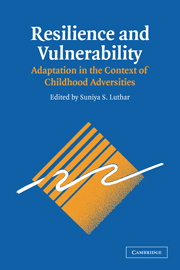Book contents
- Frontmatter
- Contents
- List of Contributors
- Foreword by Dante Cicchetti
- Preface
- 1 A Resilience Framework for Research, Policy, and Practice
- PART I FAMILIAL ADVERSITIES: PARENTAL PSYCHOPATHOLOGY AND FAMILY PROCESSES
- PART II EXOSYSTEMIC AND SOCIODEMOGRAPHIC RISKS
- 10 Rethinking Resilience: A Developmental Process Perspective
- 11 Poverty and Early Childhood Adjustment
- 12 Emerging Perspectives on Context Specificity of Children's Adaptation and Resilience: Evidence from a Decade of Research with Urban Children in Adversity
- 13 Holistic Contextual Perspectives on Risk, Protection, and Competence among Low-Income Urban Adolescents
- 14 Overcoming the Odds? Adolescent Development in the Context of Urban Poverty
- 15 Adaptation among Youth Facing Multiple Risks: Prospective Research Findings
- 16 Positive Adaptation among Youth Exposed to Community Violence
- 17 Perceived Discrimination and Resilience
- 18 Promoting Resilience through Early Childhood Intervention
- PART III COMMENTARIES
- Index
- References
12 - Emerging Perspectives on Context Specificity of Children's Adaptation and Resilience: Evidence from a Decade of Research with Urban Children in Adversity
Published online by Cambridge University Press: 05 June 2012
- Frontmatter
- Contents
- List of Contributors
- Foreword by Dante Cicchetti
- Preface
- 1 A Resilience Framework for Research, Policy, and Practice
- PART I FAMILIAL ADVERSITIES: PARENTAL PSYCHOPATHOLOGY AND FAMILY PROCESSES
- PART II EXOSYSTEMIC AND SOCIODEMOGRAPHIC RISKS
- 10 Rethinking Resilience: A Developmental Process Perspective
- 11 Poverty and Early Childhood Adjustment
- 12 Emerging Perspectives on Context Specificity of Children's Adaptation and Resilience: Evidence from a Decade of Research with Urban Children in Adversity
- 13 Holistic Contextual Perspectives on Risk, Protection, and Competence among Low-Income Urban Adolescents
- 14 Overcoming the Odds? Adolescent Development in the Context of Urban Poverty
- 15 Adaptation among Youth Facing Multiple Risks: Prospective Research Findings
- 16 Positive Adaptation among Youth Exposed to Community Violence
- 17 Perceived Discrimination and Resilience
- 18 Promoting Resilience through Early Childhood Intervention
- PART III COMMENTARIES
- Index
- References
Summary
To what extent are the processes that promote children's competence and their resilience universal (i.e., comparable for children across populations) or specific (i.e., different in their effectiveness according to a child's social context and individual endowment)? On the one hand, reviews of research comparing diverse populations of children underscore that there are common adaptive systems (e.g., sound intellectual functioning; secure parent–child attachment relationships) that promote positive developmental outcomes for children across favorable and unfavorable environments (e.g., Masten, 2001; Masten & Coatsworth, 1998). On the other hand, there is building empirical evidence pointing to the context specificity of many protective processes. For example, some emotion-regulation processes that enhance resilience among maltreated children are not associated with resilience in other populations of children (Cicchetti & Rogosch, 1997). Those investigators found that maltreated children who showed enhanced adjustment had more restrictive emotional self-regulation styles and drew on fewer relational resources compared to poor, nonmaltreated children who also demonstrated positive adjustment over time. Studies of children with depressed parents also point to context-specific coping and adaptation. Children with depressed parents benefit from gaining age-appropriate knowledge about depression and from using that knowledge to develop skills for maintaining psychological separateness from a parent's illness (Beardslee & Podorefsky, 1988).
Those contrasting perspectives demonstrate the need for more knowledge of how contexts influence (and are influenced by) positive developmental processes and resilience. Contexts include differences in communities (e.g., availability of mentors), family settings (emotional tone, cohesion), and within children (e.g., temperament).
- Type
- Chapter
- Information
- Resilience and VulnerabilityAdaptation in the Context of Childhood Adversities, pp. 293 - 317Publisher: Cambridge University PressPrint publication year: 2003
References
- 52
- Cited by



